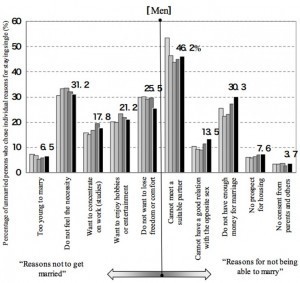Japan’s Demographic Decline
It’s one thing to naturally have fewer kids as a country urbanizes and gets more wealthy. It costs more to raise and educate kids in such a society and so couples naturally choose to have fewer kids and educate them better. Every developed country has seen such trends, as have the urban populations of emerging countries.
But there’s something different in Japan, something downright scary. They not only have one of the lowest birth rates per 100,000 women of 1.41 vs. a 2.1 replacement rate, but single and married people increasingly have no interest in sex or romantic relationships.
I’ve commented on this before, but there is a good 2011 report by Japan’s population center that has more detail on this dangerous trend.
The one thing that Japan, East Asia and southern Europe share is that women get virtually no help from the government, corporations or their husbands when they have kids.
But in Japan it goes farther…
No Wedding BellsHere are some key findings:
1. 45% of women and 25% of men 16 to 24 are “not interested in or despised sexual contact.”
2. More than 49% of Japanese citizens are single.
3. 40% of unmarried men and 61% of unmarried women age 18 to 34 are not in any kind of romantic relationship.
4. 23% of women and 27% of men say “they are not interested in any kind of romantic relationship.”
5. 39% of Japanese women and 36% of men of child-bearing age, 18 to 34, have never had sex.
6. Women in their early 20s have a 25% chance of never getting married and a 40% chance of never having kids.
Japanese laws and social customs make it extremely difficult for women to have a career and a family. Women who get pregnant, or even just marry, are generally expected to quit work and become a housewife.
The following chart shows men’s reasons for staying single. I’ll quote the survey results for women as well and they’re mostly similar. The survey was taken periodically between 1987 and 2011. There are 5 surveys in order but I’ll quote the most recent one in 2011.

Source: National Institute of Population and Social Security Research of Japan
The key reasons were:
1. 46.2% of men and 51.3% of women: “cannot meet a suitable partner.”
2. 31.2% of men and 30.4% of women: “don’t feel the necessity.”
3. 30.3% of men and 16.5% of women: “do not have enough money.” (Here’s where men differed the most for obvious reasons and a poor economy.)
4. 25.5% of men and 31.1% of women: “do not want to lose freedom or comfort.” (This is where women rated higher due to conflict with career ambitions for them.)
On top of this extraordinarily high lack of interest in sex and having families, the Japanese live longer than any other wealthy country in the world, with a life expectancy of 84 vs. 79 in the U.S. and 80 to 81 in most of Europe.
That means they retire longer and require more support from a dwindling workforce.
In 2012, Japan’s population fell 212,000 with 1,256,254 deaths vs. 1,037,101 births making up almost all of that difference and further hampered by very minor immigration. Japan’s population is projected to fall from a peak of 128 million recently to about 97 million by 2050… that’s a decline of 24%.
Much worse and even more critical is the enormous fall in workforce growth of the population aged 15 to 64. It peaked in the mid-1990s at 87 million and is projected to fall to 48 million by 2050. A whopping 45%!
By 2050, that 48 million workforce will be supporting 37 million elderly aged 65 and over.
If this isn’t economic suicide, or Hara-kiri, I don’t know what is.

Harry
Ahead of the Curve with Ben BenoySelf-Tracking Health


